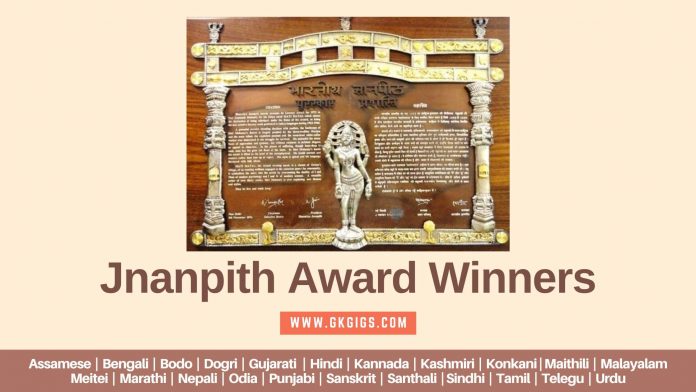
Last Updated: 1 August 2023
Before we get into the list of the Jnanpith Award, let’s have a quick intro about this award!
The Jnanpith Award (Gyanpith Puraskar in Hindi) is the oldest and the highest Indian literary award presented annually by the Bharatiya Jnanpith to an author for their “outstanding contribution towards literature”.
The Bharatiya Jnanpith was founded in 1944 as a research and cultural institute by industrialist Sahu Shanti Prasad Jain of the Sahu Jain family, who conceived an idea in May 1961 to start a scheme “Commanding National Prestige and of International Standard” to “Select the Best Book out of the Publications in the Indian Languages”.
The award was instituted in 1961 and is bestowed only on Indian writers writing in Indian languages included in the Eighth Schedule to the Constitution of India (22 Languages) and English with no Posthumous Conferral.
As per Articles 344(1) and 351 of the Indian Constitution, the eighth schedule includes the recognition of the following 22 languages:
| 1) Assamese | 9) Konkani | 17) Sanskrit |
| 2) Bengali | 10) Maithili | 18) Santhali |
| 3) Bodo | 11) Malayalam | 19) Sindhi |
| 4) Dogri | 12) Meitei | 20) Tamil |
| 5) Gujarati | 13) Marathi | 21) Telugu |
| 6) Hindi | 14) Nepali | 22) Urdu |
| 7) Kannada | 15) Odia | |
| 8) Kashmiri | 16) Punjabi |
Page Contents
Facts About Jnanpith Award
- From 1965 till 1981, the award was given to the authors for their “most outstanding work” and consisted of a citation plaque, a cash prize, and a bronze replica of Saraswati, the Hindu goddess of knowledge and wisdom.
- The first recipient of the award was the Malayalam writer G. Sankara Kurup who received the award in 1965 for his collection of poems, Odakkuzhal (The Bamboo Flute), published in 1950.
- The rules were revised in subsequent years to consider only works published during the preceding twenty years, excluding the year for which the award was to be given, and the cash prize was increased to ₹1.5 lakhs (equivalent to ₹26 lakh or US$33,000 in 2020) from 1981.
- As of 2015, the cash prize has been revised to ₹11 lakhs (equivalent to ₹14 lakh or US$18,000 in 2020) and out of twenty-three eligible languages the award has been presented for works in sixteen languages: Hindi (eleven), Kannada (eight), Bengali and Malayalam (six each), Gujarati, Marathi, Odia, and Urdu (four each), Assamese and Telugu (three each), Punjabi, Tamil and Konkani (two each), English, Kashmiri and Sanskrit (one each).
- The award has been conferred upon fifty-eight writers including seven women authors.
- In 1976, Bengali novelist Ashapoorna Devi became the first woman to win the award and was honored for the 1965 novel Prothom Protishruti (The First Promise), the first in a trilogy.
Rules & Selection Process
- The nominations for the award are received from various literary experts, teachers, critics, universities, and numerous literary and language associations.
- Every three years, an advisory committee is constituted for each of the languages.
- The language of the most recent recipient’s work is not eligible for consideration for the next two years.
- Each committee consists of three literary critics and scholars of their respective languages.
- All the nominations are scrutinized by the committee and their recommendations are submitted to the Jnanpith Award Selection Board (Pravara Parishad).
- The Selection Board consists of between seven and eleven members of “high repute and integrity”.
- Each member is part of the committee for a term of three years which can also be extended further for two more terms.
- The recommendations of all language advisory committees are evaluated by the board based on complete or partial translations of the selected writings of the proposed writers into Hindi or English.
- The recipient for a particular year is announced by the Selection Board, which has final authority in selection.
Jnanpith Award Winners
| Serial | Year | Recipients | Language |
|---|---|---|---|
| 57th | 2022 | Damodar Mauzo | Konkani |
| 56th | 2021 | Nilamani Phookan | Assamese |
| 55th | 2019 | Akkitham Achuthan Namboothiri | Malayalam |
| 54th | 2018 | Amitav Ghosh | English |
| 53rd | 2017 | Krishna Sobti | Hindi |
| 52nd | 2016 | Shankha Ghosh | Bengali |
| 51st | 2015 | Raghuveer Chaudhari | Gujarati |
| 50th | 2014 | Bhalchandra Nemade | Marathi |
| 49th | 2013 | Kedarnath Singh | Hindi |
| 48th | 2012 | Ravuri Bharadhwaja | Telugu |
| 47th | 2011 | Pratibha Ray | Odia |
| 46th | 2010 | Chandrashekhara Kambara | Kannada |
| 45th | 2009† | Amarkant | Hindi |
| 45th | 2009† | Srilal Sukla | Hindi |
| 44th | 2008 | Akhlaq Mohammed Khan ‘Shahryar’ | Urdu |
| 43rd | 2007 | O. N. V. Kurup | Malayalam |
| 42nd | 2006† | Ravindra Kelekar | Konkani |
| 42nd | 2006† | Satya Vrat Shastri | Sanskrit |
| 41st | 2005 | Kunwar Narayan | Hindi |
| 40th | 2004 | Rehman Rahi | Kashmiri |
| 39th | 2003 | Vinda Karandikar | Marathi |
| 38th | 2002 | Jayakanthan | Tamil |
| 37th | 2001 | Rajendra Shah | Gujarati |
| 36th | 2000 | Mamoni Raisom Goswami | Assamese |
| 35th | 1999† | Nirmal Verma | Hindi |
| 35th | 1999† | Gurdial Singh | Punjabi |
| 34th | 1998 | Girish Karnad | Kannada |
| 33rd | 1997 | Ali Sardar Jafri | Urdu |
| 32nd | 1996 | Mahasweta Devi | Bengali |
| 31st | 1995 | M. T. Vasudevan Nair | Malayalam |
| 30th | 1994 | U. R. Ananthamurthy | Kannada |
| 29th | 1993 | Sitakant Mahapatra | Odia |
| 28th | 1992 | Naresh Mehta | Hindi |
| 27th | 1991 | Subhash Mukhopadhyay | Bengali |
| 26th | 1990 | Vinayaka Krishna Gokak | Kannada |
| 25th | 1989 | Qurratulain Hyder | Urdu |
| 24th | 1988 | C. Narayana Reddy | Telugu |
| 23rd | 1987 | Vishnu Vaman Shirwadkar ‘Kusumagraj’ | Marathi |
| 22nd | 1986 | Sachidananda Routray | Odia |
| 21st | 1985 | Pannalal Patel | Gujarati |
| 20th | 1984 | Thakazhi Sivasankara Pillai | Malayalam |
| 19th | 1983 | Masti Venkatesha Iyengar | Kannada |
| 18th | 1982 | Mahadevi Varma | Hindi |
| 17th | 1981 | Amrita Pritam | Punjabi |
| 16th | 1980 | S. K. Pottekkatt | Malayalam |
| 15th | 1979 | Birendra Kumar Bhattacharya | Assamese |
| 14th | 1978 | Sachchidananda Vatsyayan | Hindi |
| 13th | 1977 | K. Shivaram Karanth | Kannada |
| 12th | 1976 | Ashapoorna Devi | Bengali |
| 11th | 1975 | Akilan | Tamil |
| 10th | 1974 | Vishnu Sakharam Khandekar | Marathi |
| 9th | 1973† | D. R. Bendre | Kannada |
| 9th | 1973† | Gopinath Mohanty | Odia |
| 8th | 1972 | Ramdhari Singh ‘Dinkar’ | Hindi |
| 7th | 1971 | Bishnu Dey | Bengali |
| 6th | 1970 | Viswanatha Satyanarayana | Telugu |
| 5th | 1969 | Firaq Gorakhpuri | Urdu |
| 4th | 1968 | Sumitranandan Pant | Hindi |
| 3rd | 1967† | Umashankar Joshi | Gujarati |
| 3rd | 1967† | Kuppali Venkatappa Puttappa ‘Kuvempu’ | Kannada |
| 2nd | 1966 | Tarasankar Bandyopadhyay | Bengali |
| 1st | 1965 | G. Sankara Kurup | Malayalam |
| Read More |
- Bharat Ratna Award List In India (1954-2023)
- List Of Arjuna Award Recipients (1961–2023)
- List Of Dronacharya Award Recipients (1985-2023)
- Major Dhyan Chand Khel Ratna Award (2023 Updated)
- 100+ Electric Car Companies With Car Models (2023 Updated)












